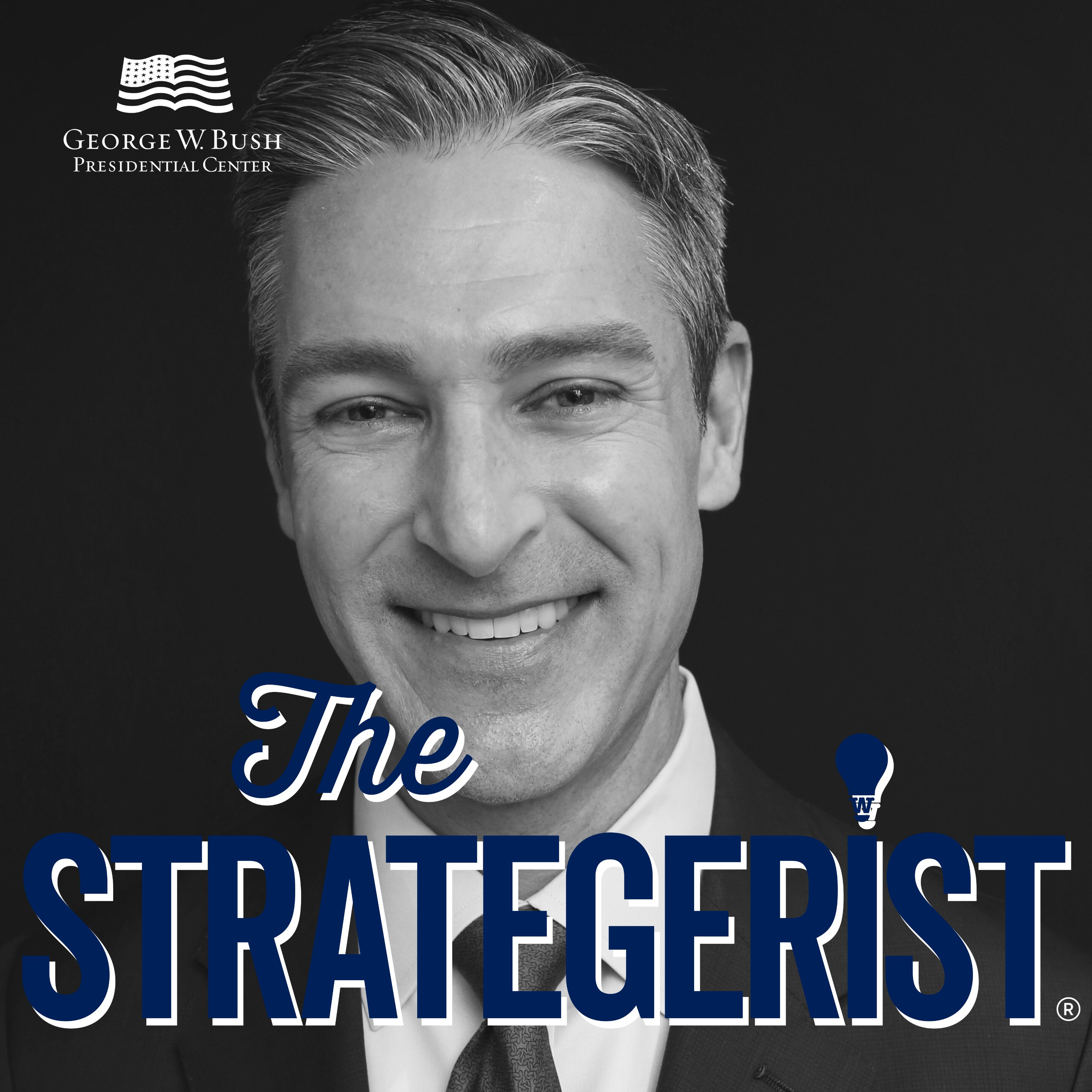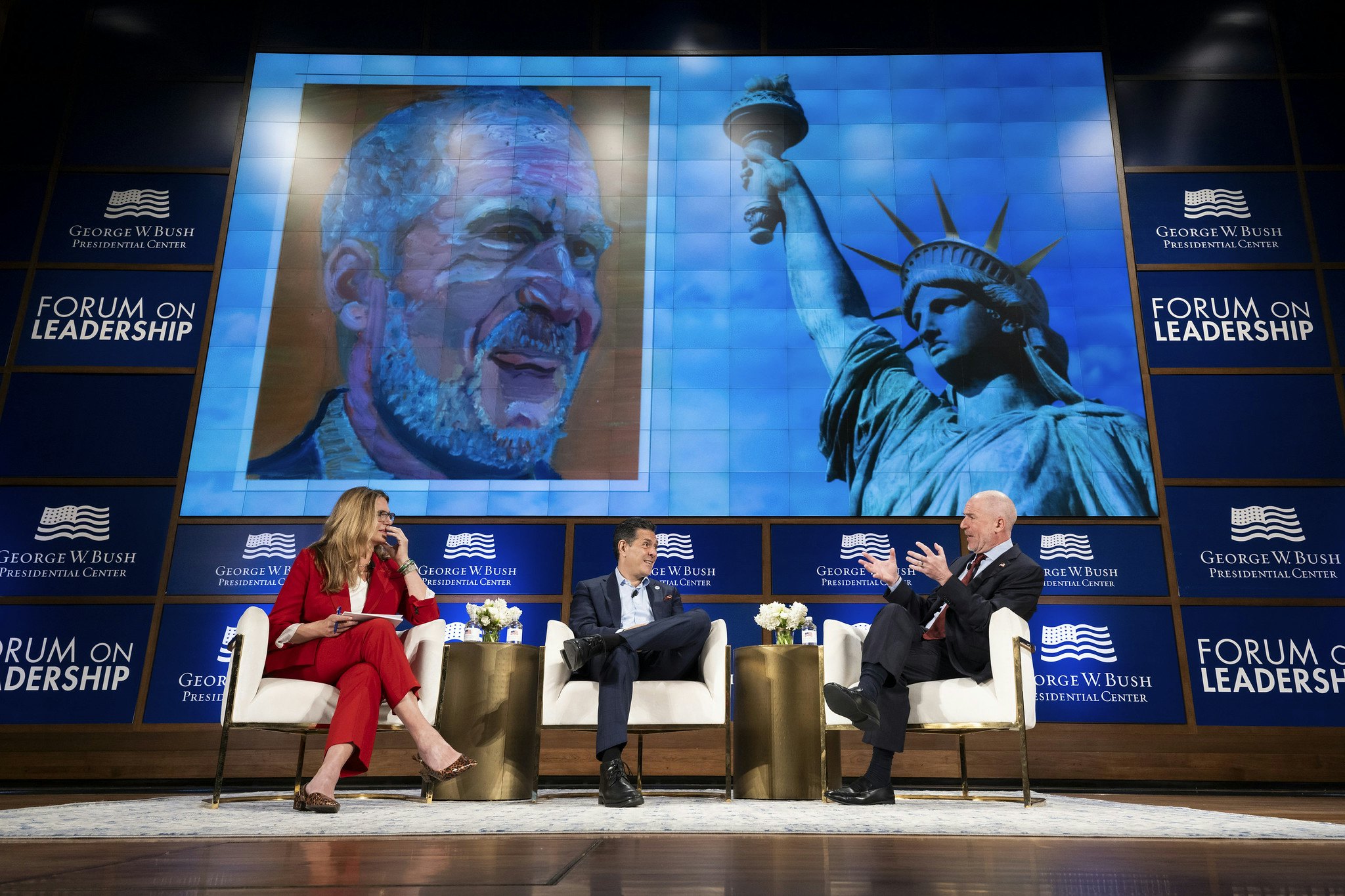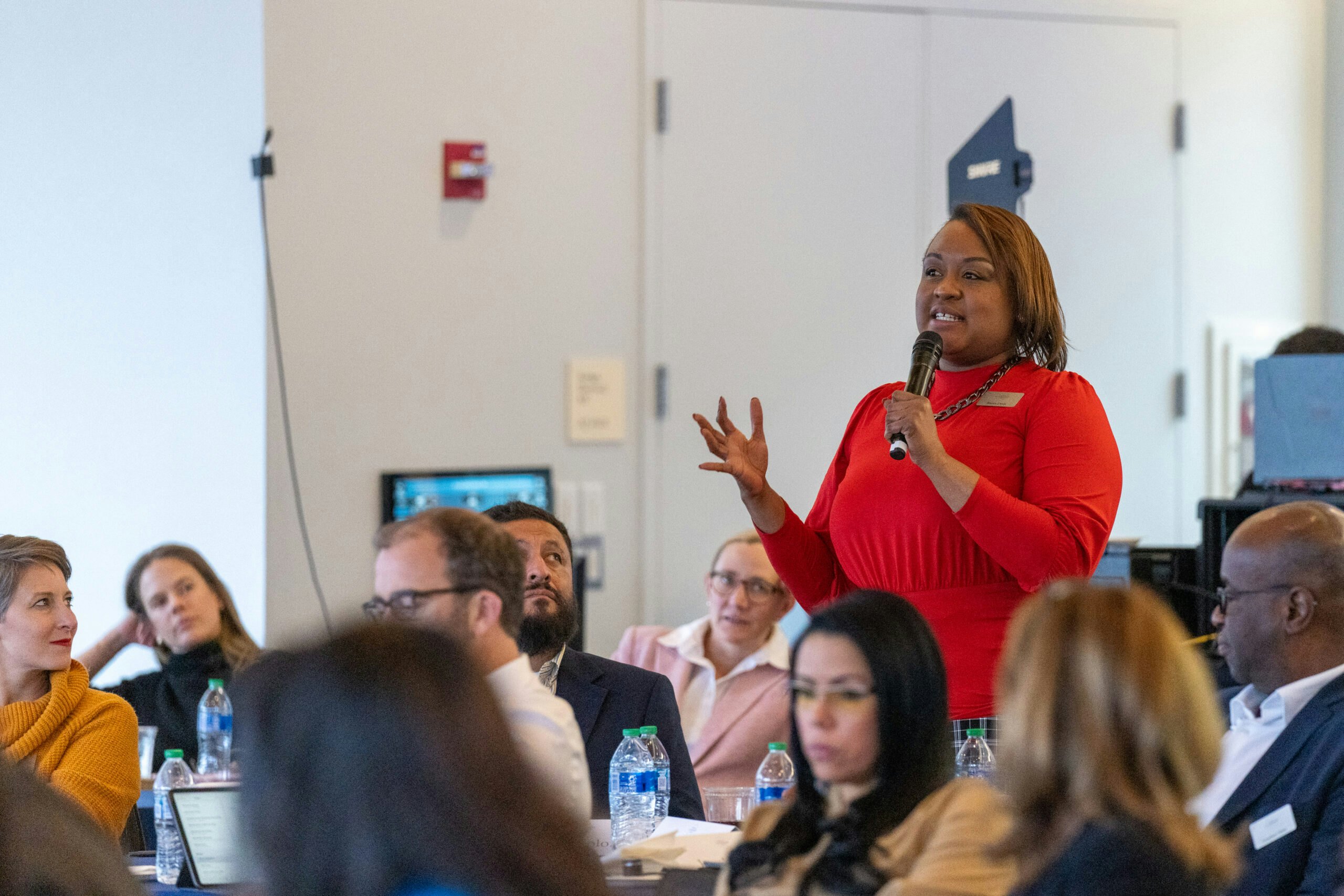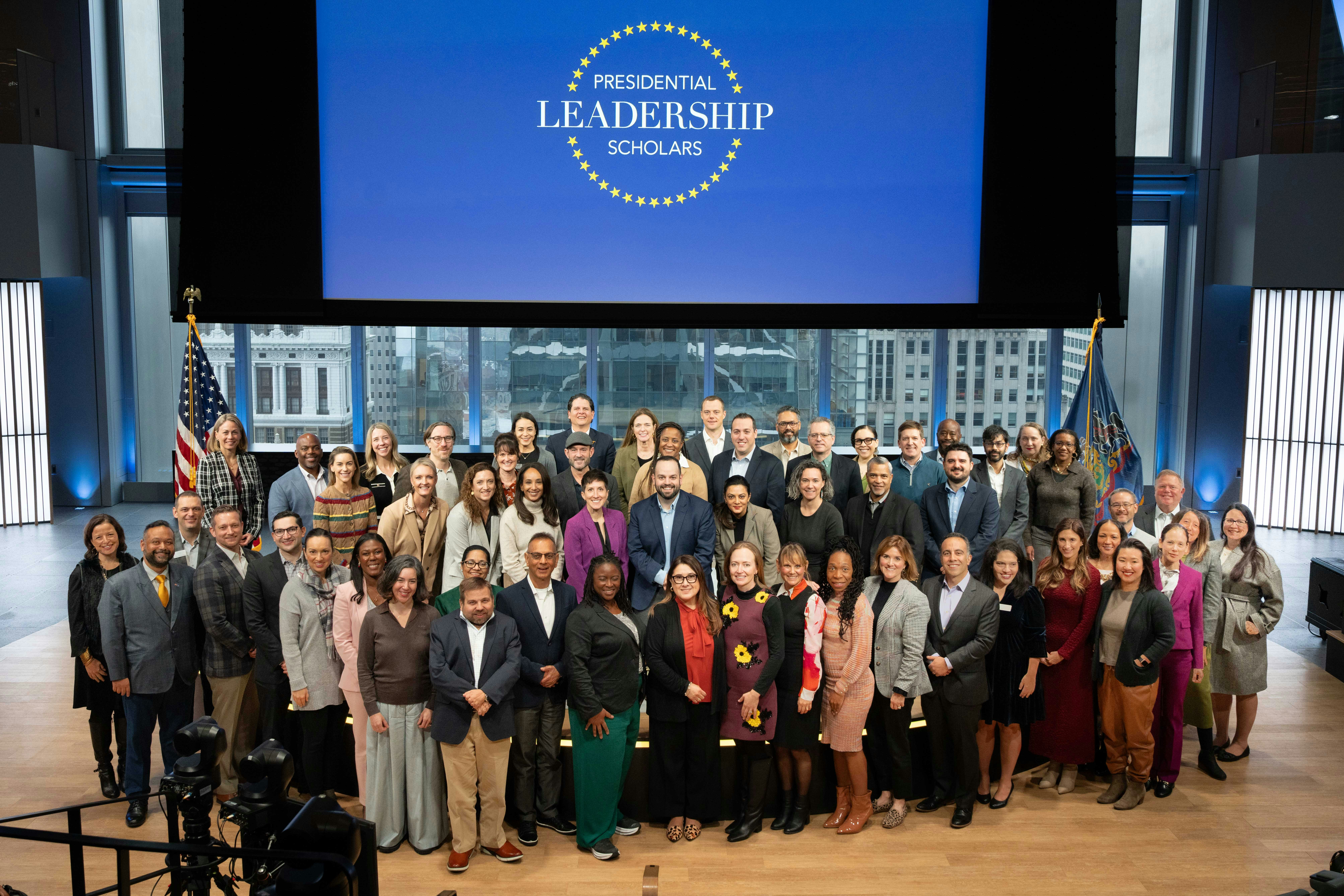Frederick Riley, Executive Director of Weave: The Social Fabric Project, details how “trust brokers” repair the breakdown in social trust by creating connections in their communities.
Frederick Riley is Executive Director of Weave: The Social Fabric Project. The aim of the Aspen Institute initiative is to strengthen social trust in communities around America. Founded by New York Times columnist David Brooks, Weave seeks to create connections that “weave” together a strong social fabric.
Riley spoke about Weave’s work with Lindsay Lloyd, the Bradford M. Freeman Director of the Human Freedom Initiative at the George W. Bush Institute, Chris Walsh, Senior Program Manager in the Human Freedom Initiative, and William McKenzie, Senior Editorial Advisor at the Bush Institute. Riley, who previously worked for the YMCA, details how “trust brokers” repair the breakdown in social trust by creating connections in their communities. He contends that transparency about policies and giving people a voice in community decisions is key, especially among Black and Brown Americans and younger people. Riley also believes there is no tension between showing up for others in a community and valuing our personal liberties.
How do you define civic engagement?
I think about the places where people learn how to get involved, where they learn about the moralistic responsibility that we all have to the greater society.
I say it that way because for about 16 years, I worked for YMCAs around the country. For five of those years, I was the National Director of Urban and Youth Development at YMCA of the USA. Part of my portfolio included the thought leadership of civic engagement programs. We helped young people craft or hone their views about how they could give back to society, whether through volunteering, learning more about policy, or helping register folks to vote.
We all have this moralistic lens in which we have to give back. Civic engagement guides people to figure out what that is.
Are there common characteristics of successful civic engagement?
At the center of civic engagement is trust. Social trust is really low now in our society. I don’t care how much civic engagement you do, if trust is not at the forefront of the engagement, the civic engagement will be for nothing. That’s at the core of the issues facing the United States.
Weave certainly focuses on strengthening social trust. Where do you see it being strengthened in local communities? How is it being created?
I like to call the people building social trust in local communities “Weavers.” They weave folks together across differences and help fix problems and build trust. A Weaver could be the neighborhood watch leader, for example. Everybody knows and trusts the Weavers. They really broker trust for others, especially when someone wants to move into the community.
Young people, especially college-age young people, don’t trust anybody right now. So, the Weave Project’s work centers around inspiring them to recognize that they can still be trusting of others and can be trusted themselves. We try to build better leaders and support them to be trust brokers in communities, using their trust to build trust in others. If young people get to 26, and trust hasn’t been brokered, they’re almost lost to our society. This is why it’s more important now than ever to find ways to broker trust.
Tell us how trust brokers create connections that impact their communities.
I’ll give an example. Asiaha Butler is a Weaver in Chicago in the Englewood neighborhood. She wanted to leave Englewood, worried about raising her kids amidst the poverty, crime, and despair. One day when she was looking out her window and saw kids playing amidst dirt and broken glass in a vacant lot across the street, she decided she couldn’t be one more person giving up on the neighborhood. She decided she needed to do something about that.
If you have ever visited neighborhoods on the South and West sides of Chicago, you’ll see a home and then two vacant lots, and you will see a home and then three vacant lots. These once were vibrant communities, but the homes are gone. So Asiaha created an organization, and they petitioned the city to sell them the lots. She and her neighbors bought up the lots and put in parks, playgrounds, and even homework stations. They wanted a safe place for young people to gather.
Asiaha is a good example of a trust broker in her community. When the neighborhood store was looted last summer, Asiaha and her neighbors rebuilt the shelves. They had friends at the food bank who helped them replenish the store so people could get food.
Asiaha is the person that others go to when they need help. She’s also showing the folks of Englewood that the systems can work, that neighbors care about each other. All the time, she’s helping to broker trust.
We’re having a renewed conversation about racial justice in this country, so how is the struggle for racial justice impacting the building of social trust?
Researchers show that Black and Brown groups have low levels of trust in the system, but they have high levels of trust in each other, meaning, their communities. Until we see great strides in racial justice, you will continue to see these disparities in trust. Until the system catches up with the growth in our greater society, we will always see a smaller number of minorities who trust the system. We have to figure out how to include everybody in this conversation about trust. If not, folks won’t buy into it.
How can local, state, or national leaders help build trust? How can they create a common purpose for communities?
People now don’t trust political leaders because political leaders represent the system. And folks don’t see the system as working for them.
But there are a couple of things that mayors, state representatives, and people in Washington can do. They need to be transparent about how current policies either adversely impact or support people in communities. People are smart and want to know the truth. We have to respect where people live in their communities, buy groceries, send their kids to school, and sleep at night. We need to give them a voice in decisions.
When you do those things, I promise you, people will follow. My grandmother would say, “I’ll take the ugly nasty truth over the little sweet lie.”
Until we see great strides in racial justice, you will continue to see these disparities in trust. Until the system catches up with the growth in our greater society, we will always see a smaller number of minorities who trust the system.
Let’s talk more about the youth that you brought up in the story about Asiaha and Englewood. What have you discovered about young people and strengthening social trust? What needs to happen more to build bonds between young Americans and their communities?
We ought to be worried about young people in college. They are less likely to trust and have intergenerational connections. You have to prove to them that what you are saying is true.
Youth development books talk about “concerted cultivation,” which is what typically parents in higher-income zip codes do. They create a schedule. They create lists. They curate the class schedule. They hover over their kids because they want their kids to be successful. But these young people don’t figure out how to make decisions for themselves.
Then you have young people who grew up in lower-income zip codes who have higher levels of grit. They don’t necessarily go to college, and they don’t trust the system. But their level of trust within their community is higher than with students in the higher- income neighborhoods.
The issue, then, is how do young people whose parents are brokering everything for them develop trust? They are opting out of systems, such as church and politics, because they have little trust. These are the same people who will one day inherit the statehouses, the White House, the mayor’s office, and our corporations.
The danger is that you need to develop trust by age 26. That is when experts say brain development is finished. Our country will be in a turmoil if the future leaders of the system don’t develop trust by then.
That’s depressing.
It is depressing, but there is work being done now. Social trust is a hot-button issue. In some developing countries, social trust is growing because governments decided to be transparent and train better leaders or inspire leaders to be different. They decided they want to empower people who are working locally to work together, to fix their own issues. Those are the drivers of social trust. And they decided to include everybody in their decisions.
Young people on college campuses want to be involved in the decision-making process. They want to be part of everything that we’re doing. They don’t want things to be done to them. They want it to be done with them.
We have to think about that as we continue to lead this next generation. I’m going to work for them one day, so I want them to have this high level of trust. [Laughter]
How are young people responding to what you are talking about? Is their response mostly positive or mostly negative?
Really positive. Some older people may have reached a high pinnacle in their career and then want to give back to society, which David Brooks calls “climbing the second mountain.” But this younger generation is saying, “We can do this now.” Young people want to work for places and in organizations where they feel like they are being impactful to the world as a whole.
We just have to guide them how to do that, and then follow their lead.
Where do you see people having civil discussions? How is that happening?
My go-to is trust. Trust is what helps those discussions happen.
We don’t see each other as humans now. We see each other as representatives of an issue. We have to move the issue to the side and unpack the humanity that we all enter these conversations with. That will ultimately lead to civil discourse.
My first understanding of political discourse happened in fifth grade when Bill Clinton was running for president. We watched the debates and argued for our candidates. There were teachers in this all-Black neighborhood who had Republican bumper stickers on their cars. But people didn’t think that they were racist or didn’t trust them any less because they had a different party affiliation. We just knew it was part of the democratic process.
The Weave Manifesto says, “Modern society needs a moral ecology that rejects the reigning hyper individualism of the moment.” How might a moral ecology play out in communities?
It’s what Asiaha did. Asiaha could have bought a house in another neighborhood, as she was planning to do. She could have been safer, lived better, and run away from the problems her community faced. It could have been about her, her husband, and her kids. She didn’t have to be about the entire neighborhood. But there is the African proverb: “I am because you are. Because you are, therefore, I am.” I have to be concerned about what happens to others, if I’m going to be okay.
We’re losing that in society, although I don’t want us to think that all people in communities are all selfish. We see Weavers everywhere who are quietly working around the country to bring us together. There’s no need for Weave to inspire them because they’re already doing these things. I want to make sure those people get highlighted and celebrated. When the rest of us hear more of their stories, it sparks us to join this crusade.
Asiaha is the person that others go to when they need help. She’s also showing the folks of Englewood that the systems can work, that neighbors care about each other. All the time, she’s helping to broker trust.
How do you tap into stories at the community level? People aren’t just waiting for the Aspen Institute or Bush Institute to come out with a program. How did this happen with you all?
The first year, David Brooks and a team of interns started calling communities around the country. They wanted to know who showed up for other people. They started hearing the same story in every community, “Oh, there’s a butcher here. Or there’s a barber here. Or there’s a lady who puts books in the mailbox, but she also feeds the homeless.”
Weave would go into those communities and try to learn why people were doing what they were doing. They weren’t getting paid for it. Nobody was putting their picture on the front page of the newspaper. But they felt that if nobody was going to do it, and if the system wasn’t going to help, they would be the ones who would stand up and do it. That prompted other folks to join in. That is what has happened in those communities around the country.
That is what we hope will happen everywhere. That you’ll hear about a Weaver in Chicago, D.C., or El Paso and decide if they can do this, I can, too. I’m going to go back to my community and make it work. Ultimately, that will change the trajectory of our society.
How do you make this work so that there isn’t a false choice between a community that supports one another and my individual freedoms? How do you make them complement each other?
Individual liberties are important. But you don’t have to get rid of your personal liberties to be of service to your neighbor. And not just for your neighbor, but for everybody who lives on the street. I can exercise all of my liberties as a human being, but I still show up for people daily. That’s the most important side of our freedom.



























